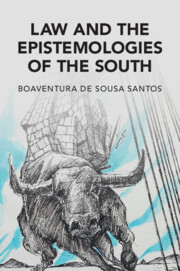Book contents
- Law and the Epistemologies of the South
- CAMBRIDGE STUDIES IN LAW AND SOCIETY
- Law and the Epistemologies of the South
- Copyright page
- Contents
- Preface
- Abbreviations
- Part One The Tragic Optimism of the Law: THE END OF A STORY
- One Unsettling Times
- Two The End of Legal Reformism?
- Three The Early Demise of Legal Reformism: My Journey through the Law and Modernisation Program at Yale University
- Four Room for Manoeuvre: Paradox, Programme, or Pandora’s Box?
- Part Two Epistemologies of the South and the Law
- Part Three The Abyssal Law under the Mode of Abyssal Exclusion
- Part Four Real Legal Utopias: Interrupting the State
- Part Five Real Legal Utopias: Interrupting the Law
- Part Six Real Legal Utopias: Interrupting Hegemonic Human Rights
- References
- Index
- Cambridge Studies in Law and Society
Two - The End of Legal Reformism?
from Part One - The Tragic Optimism of the Law: THE END OF A STORY
Published online by Cambridge University Press: 07 August 2023
- Law and the Epistemologies of the South
- CAMBRIDGE STUDIES IN LAW AND SOCIETY
- Law and the Epistemologies of the South
- Copyright page
- Contents
- Preface
- Abbreviations
- Part One The Tragic Optimism of the Law: THE END OF A STORY
- One Unsettling Times
- Two The End of Legal Reformism?
- Three The Early Demise of Legal Reformism: My Journey through the Law and Modernisation Program at Yale University
- Four Room for Manoeuvre: Paradox, Programme, or Pandora’s Box?
- Part Two Epistemologies of the South and the Law
- Part Three The Abyssal Law under the Mode of Abyssal Exclusion
- Part Four Real Legal Utopias: Interrupting the State
- Part Five Real Legal Utopias: Interrupting the Law
- Part Six Real Legal Utopias: Interrupting Hegemonic Human Rights
- References
- Index
- Cambridge Studies in Law and Society
Summary
In this chapter, I briefly analyse the fate of legal reformism. The global financial crisis of 2008 which reverberated in Europe in 2011, the crises of progressive governments in Latin America in the second decade of the millennium, and the economic and social meltdown caused by the pandemic of the new coronavirus are all signs of a deeper malaise in the development model that sustained legal reformism for the past hundred years. The end of legal reformism started when the ideal of democracy and the rule of law ceased to be a progressive objective which progressive forces had struggled for in many countries, often at great personal risk, and became an international imposition, a condition of development assistance and structural adjustment policies demanded by the World Bank and the IMF. Throughout the 1960s and 1970s, political science invested a great deal of research in identifying conditions for the sustained adoption of liberal democracy in the developing world, which included agrarian reform, a sizeable middle class, and a certain balance between urban and rural areas. From one day to the next, all of this research was consigned to the dustbin of history. Rather than focusing on the conditions for democracy and the rule of law, the “international community” converted democracy and the rule of law into the conditions for everything else, and most importantly for receiving development assistance and financing. Liberal democracy became the most legitimate regime of a weak state confronted with neoliberal global impositions. Under these conditions there was no room for progressive legal reformism. Conversely, there was plenty of room for conservative authoritarian reformism or counter-reformism.
Keywords
- Type
- Chapter
- Information
- Law and the Epistemologies of the South , pp. 22 - 37Publisher: Cambridge University PressPrint publication year: 2023

